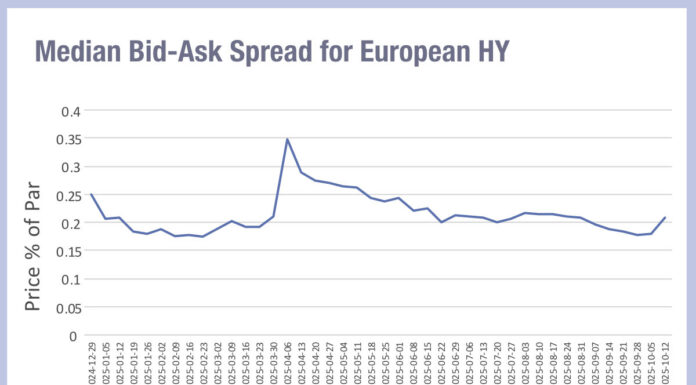LedgerEdge, the distributed ledger-based fixed income trading venue, has closed down.

Founder, David Rutter, said, “We can confirm LedgerEdge has closed, three years after being established. We launched the business in 2020 with the aim of further digitising a traditional corporate bond market where electronic trading had yet to breach much more than a third of total volumes, and to provide an alternative model delivering choice, flexibility and liquidity discovery.”
The firm reportedly received lower than expected investment from sell-side firms last year. It has struggled to gain critical mass with users, had been slowed by a delayed regulatory approval process and saw a significant change in management at the end of last year.
According to a 2022 regulatory filing, LedgerEdge is a wholly-owned subsidiary of LedgerEdge Inc, which is controlled 76.15% by co-founder David E. Rutter, 3.85% by Flow Traders US Holding LLC and 20% by LedgerEdge Holding Company LP. All entities are under common management and control. “An extremely challenging funding environment was not conducive to extending the runway for the business, despite improved traction in 2023 and strong client support,” Rutter confirmed.
Higher interest rates and disruption in the financial space, notably with the UBS takeover of Credit Suisse, have all made it more challenging for financial technology firms to focus the attention of, and generate funding from, banks this year. The innovation that LedgerEdge promised to deliver was welcomed in the fixed income space. Built with distributed ledger technology (DLT), the technology underpinning blockchain ecosystems and digital markets, LedgerEdge was powered by R3’s Corda, a permissioned peer-to-peer distributed platform that supports applications designed to foster and deliver digital trust between parties in regulated markets.
It operated an executable streaming price protocol, a request for quote (RFQ) protocol, a volume matching protocol and a process trade protocol. Having gone live in May 2022, LedgerEdge’s digital market was a decentralised system that was fully regulated by the UK’s Financial Conduct Authority as a multilateral trading facility (MTF). It was built in collaboration with global banks, asset managers, and market makers, and the system was operational with 45 firms in the UK MTF and 70 globally that were either trading on the platform or in the onboarding process. These included seven out of the 10 largest sell-side dealers as well as more than 30 large asset managers. However, moving firms from the onboarding stage to full trading proved challenging, as it has for many financial technology platforms in the fixed income space.
The departure of David Nicol, then-CEO and co-founder of LedgerEdge, in December 2022 led to the firm’s chairman and co-founder, Rutter, stepping in to lead the firm in a temporary capacity. Nicol’s departure was reportedly triggered by the need for a management team with deeper industry relationships on both the buy- and sell-side as LedgerEdge sought to accelerate the pace of client onboarding, according to chairman Rutter. “LedgerEdge was a well-conceived model with huge potential and support to solve the challenges of finding and promoting corporate bond liquidity,” he said. “As is the case with new technology and protocols, there are many barriers to entry and success, especially when it comes to onboarding and adoption. This is particularly true of the corporate bond market which is traditional and used to legacy protocols, operations and ingrained technology.”
Buy-side support for the concept was considerable with many big names advocating for the platform and major executives on the buy- and sell-side being vocal in their praise. “Even when you have brilliant customer support, in particular from the buy-side, and transformative, efficient new protocols, translating that to live and active customers can take many years,” Rutter noted. “Building a new model through a cost-constrained environment through Covid has proven particularly challenging. We want to thank all of the institutions and individuals for the energy and support they provided to the concept and development of this model. We share their frustration and disappointment that together we were unable to deliver an exciting new market structure that would have enhanced the corporate bond market for all participants.”
Ultimately the challenges that LedgerEdge set out to resolve still need fixing and the market will eventually need to address these together. Like other well-supported start-ups before it, LedgerEdge has proven to be a victim of the frictions that exist for new ideas in a market with high barriers to entry. “This is a market which has considerable inefficiencies and challenges,” Rutter noted.
It should and will change through technology in the future. LedgerEdge assembled a top-flight team to work on this project. As individuals, they will no doubt retain their focus on enhancing market structure and improving trading dynamics in the future.”
©Markets Media Europe 2023
©Markets Media Europe 2025














